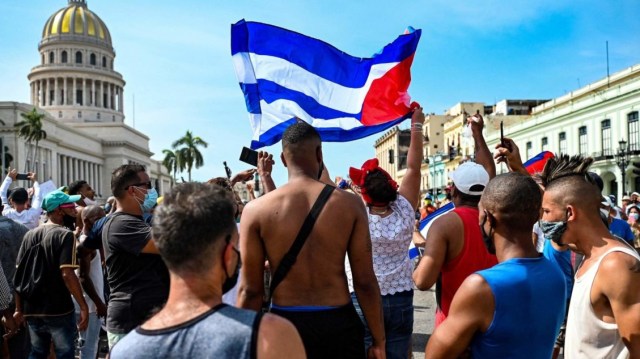
We’ve seen unrest around the world because of the pandemic and its economic impacts. But in Cuba this unrest sparked something more powerful: a call for freedom. The reasons involve Venezuelan oil production.
By Caracas Chronicles – Rafael Osío Cabrices
Jul 13, 2021
The forces of History like to play, once in a while, in unexpected places. For instance, the placid town of San Antonio de los Baños, close to Havana. Who would have imagined that on the hot morning of July 11th, that small town would spark the biggest wave of protests in the long history of the Cuban Revolution? As soon as people started sharing videos on social media of protesters taking to the streets to demand the government to provide immediate solutions for the dire economic situation and the pandemic, the unrest spread to the capital and at least 40 cities in the whole country. There was even looting in some cities and, of course, an immediate violent response from the Cuban regime. Deaths and the exact numbers of detentions haven’t been confirmed by independent media.
The last time something similar happened was in 1994, in the harshest times of the Período Especial, those years of humanitarian crisis that started with the collapse of the Soviet Union and ended with European investments and chavista support (since 1999).
In 1994, Fidel Castro released pressure by allowing many people to jump to the sea and board boats to the U.S. Back then, the economic hardship was also the spark, but this time, additional factors are in place. Fidel Castro isn’t around, but uncharismatic and mediocre President Miguel Díaz Canel. Now, Cubans are overwhelmed also by COVID-19: on July 11th, when protests erupted, the government reported a record of 47 deaths in a day and almost 7,000 new cases. And now, a big part of the problem isn’t the absence of Russian oil, but the decline of Venezuelan oil imports.
It’s the Economy, Asere
Cuba is experiencing a hard time, even for a socialist country. Chronic shortages, long lines and rocketing prices are back. The Cuban GDP lost ten points in 2020. The pandemic stopped the influx of tourists and with it, the income in foreign currency the country needs to import everything that Cuba doesn’t produce. Remittances from Cubans abroad face several restrictions because of the U.S. measures against the island, given that the Biden administration hasn’t changed the policies implemented by Trump to scale back the Obama approach. The Cuban government announced last month that it will temporarily suspend USD cash deposits in Cuban banks, forcing people to run to local banks and leave – in the hands of the government – the dollars needed to pay international debt and avoid default.
Díaz Canel hasn’t been able to advance the Chinese-inspired timid economic reform he and Raúl Castro promised to allow more space for entrepreneurship. And last but not least, Cuba is suffering the consequences of PDVSA’s demise. In San Antonio de los Baños, where the revolt started, people can spend 12 hours without power, just like in the horrible times of the 1990s Special Period.
In tropical Cuba, the continuous blackouts make everything difficult, just like Venezuela, because the power plants don’t have enough fuel to burn and produce electricity. In the past, Russian oil, and more recently Venezuelan oil (fuel oil imports to be exact), kept those old, inefficient, and highly pollutant plants working at a higher capacity. That fuel is one of the main reasons Cuba needs Venezuela so much. In exchange, the Cuban regime has provided, let’s say, technical assistance services to preserve political power forever, repress protests, organize the surveillance of its military and politicians, take advantage of socialist internationalism and alliances at the United Nations, and survive under international economic sanctions. Cuba needs Venezuelan oil to produce power and to access foreign currency (cash) by reselling. In the apex of the Chávez-Castro collaboration, Venezuela was exporting about 100,000 barrels a day to Cuba. According to the Caracas Chronicles PRR team, June 2021 exports barely reached 25,000 barrels a day (including crude oil and different kinds of fuel). Now, even when Maduro still has Cuba as a key ally that has to be paid for its multiple services to the revolution, the amount of oil Venezuela is sending to Cuba is clearly insufficient.
…
Read More: Caracas Chronicles – What the protests in Cuba have to do with Venezuela
…

